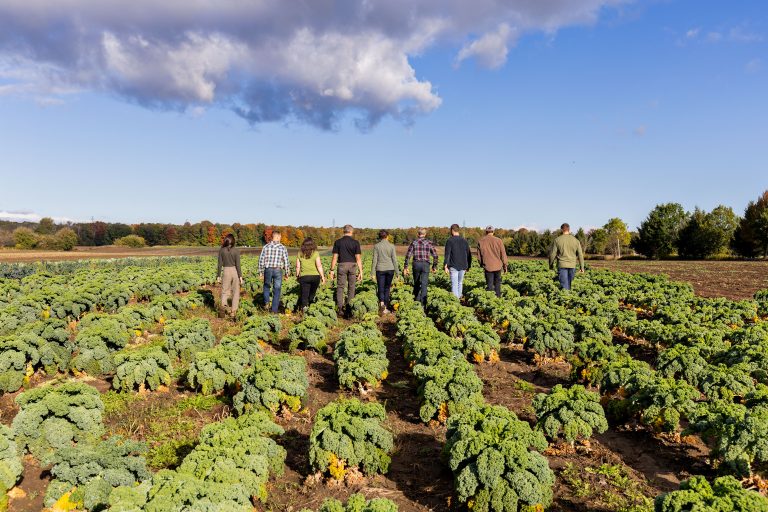
Supporting Ontario Organic Year-Round
In Ontario, eating local year-round can be a challenge. But supporting local farmers year-round doesn’t have to be! Local First We wholeheartedly encourage everyone to
Our most popular seller, the Model V is simple, robust and easy to use. Place your grain of choice in the upper rotatable millstone, and turn the handle – that’s all you have to do to produce fluffy, fresh flour! You can adjust the rate at which the grain flows from the hopper, and the fineness of the flour. In order to allow for people of very different physical strength to use the mill, and to keep the physical effort required to a minimum, SAMAP have built in double roller bearings which run on a stainless steel (rustless) vertical spindle, the lower part of which is embedded in the base. In your own kitchen, you can mill hard dry & non-oily cereals and pulses, rice, wheat, rye, oats, barley, and buckwheat. It is also possible to produce oat flakes by milling de-hulled or hull-less oats on a fairly coarse setting.
SPECIFICATIONS
setting for the fineness of the flour
the cereal being milled
the position of the in-feed adjustment
the speed of rotation
They cannot make fine flour out of damp grain. With the fine setting the stones will become smeared if the grain is too damp. The rule is quite simple: the finer the flour desired, the drier the grain must be.
When the mill is under a full load of grain the speed of the stones is about 2,800 rotations per minute. In terms of the speed at the perimeter of the stones, they revolve at 30 miles per hour.
The SAMAP commercial mills can produce very fine flour because of their powerful motors and the particular shape and design of the precision-made stones.
Stone is harder than metal and it possesses a valuable resistance to heat. Our mills use a magnesite compound, rather than engraved steel, or cast steel, or cut granite. Stone is a poor conductor of warmth in comparison to steel and it actually provides resistance to heat which is optimal for milling quality flour.
The stones of Samap grain mills consist of emery and a binding agent in which the emery is set. For our emery, we use only the extremely hard NAXOS granules. NAXOS is a naturally occurring stone that has long been mined for millstones. It is an extremely hard stone, which is beneficial for milling grain. The quality of milled flour is particularly fine when NAXOS stones grind it. The binding agent for these NAXOS emery granules consists of stabilized magnesite cement, which has similar hardness.
SAMAP has patented a special feature for temperature control. Very fine milling creates a higher temperature in any material. Because of the grain’s fineness, the high temperatures also decrease the flour’s stability. Because of this problem, the SAMAP mill has a very efficient method of cooling. A strong air stream within the mill cools the stones and carries the warmth away from the milling chamber.
It consists of two fans that work simultaneously. One fan cools the motor while a second fan, situated under the moving millstones, cools the stones. The air stream, caused by the fans, cools the stones efficiently and removes the flour from the mill chamber at the same time.
The greater the quantity of flour milled the more warmth produced in the mill. For this reason, the SAMAP grain mill has an adjustable feed inlet. This inlet allows us to mill corn, dried peas, and several other kinds of large grains at a suitable speed. The adjuster allows a very exact amount of grain to be milled at a certain time. The energy used and the warmth produced can be carefully controlled. This means the mill is never overloaded.

In Ontario, eating local year-round can be a challenge. But supporting local farmers year-round doesn’t have to be! Local First We wholeheartedly encourage everyone to

In Ontario, eating local year-round can be a challenge. But supporting local farmers year-round doesn’t have to be! Local First We wholeheartedly encourage everyone to

Advocating for the Organic Industry We are looking forward to meeting with MPP’s and policymakers at Queen’s Park, Toronto on October 25th! Organized by the

We grow beautiful leaf lettuces in Ontario, but our growing season comes to an end in the fall. At that time, we are grateful to
| Cookie | Duration | Description |
|---|---|---|
| cookielawinfo-checkbox-analytics | 11 months | This cookie is set by GDPR Cookie Consent plugin. The cookie is used to store the user consent for the cookies in the category "Analytics". |
| cookielawinfo-checkbox-functional | 11 months | The cookie is set by GDPR cookie consent to record the user consent for the cookies in the category "Functional". |
| cookielawinfo-checkbox-necessary | 11 months | This cookie is set by GDPR Cookie Consent plugin. The cookies is used to store the user consent for the cookies in the category "Necessary". |
| cookielawinfo-checkbox-others | 11 months | This cookie is set by GDPR Cookie Consent plugin. The cookie is used to store the user consent for the cookies in the category "Other. |
| cookielawinfo-checkbox-performance | 11 months | This cookie is set by GDPR Cookie Consent plugin. The cookie is used to store the user consent for the cookies in the category "Performance". |
| viewed_cookie_policy | 11 months | The cookie is set by the GDPR Cookie Consent plugin and is used to store whether or not user has consented to the use of cookies. It does not store any personal data. |
